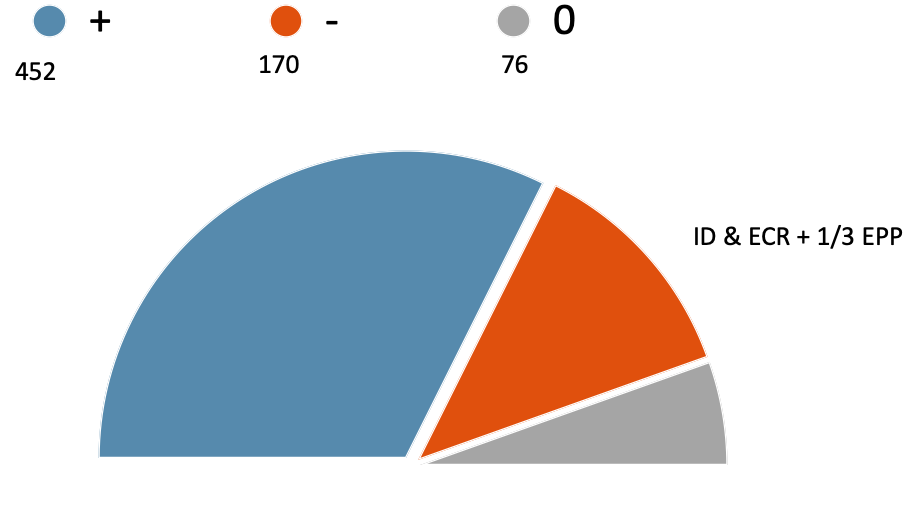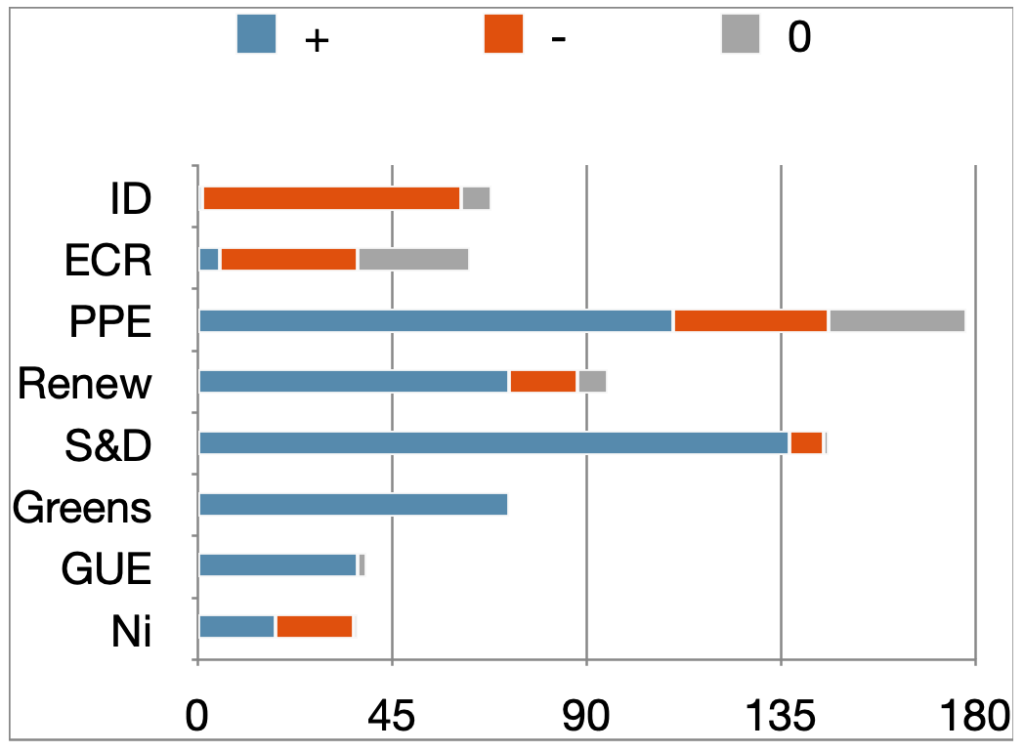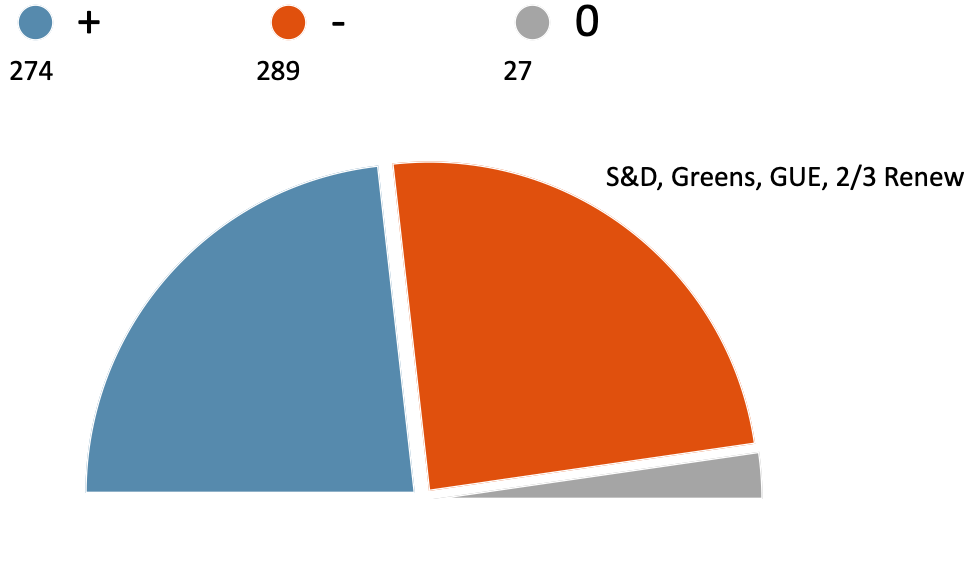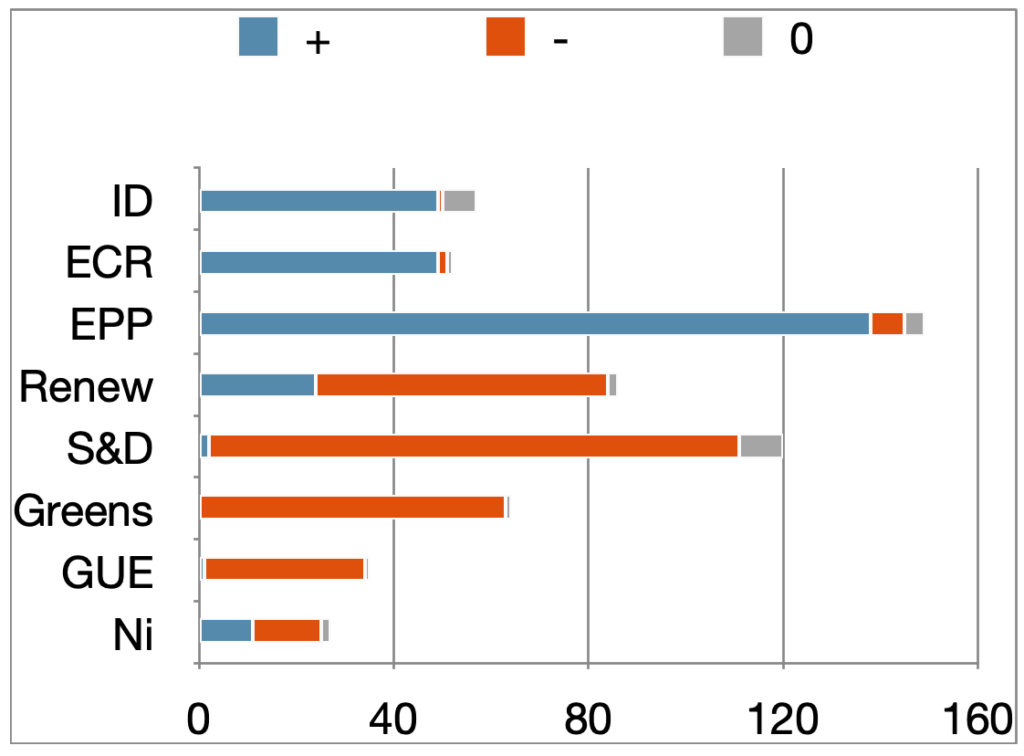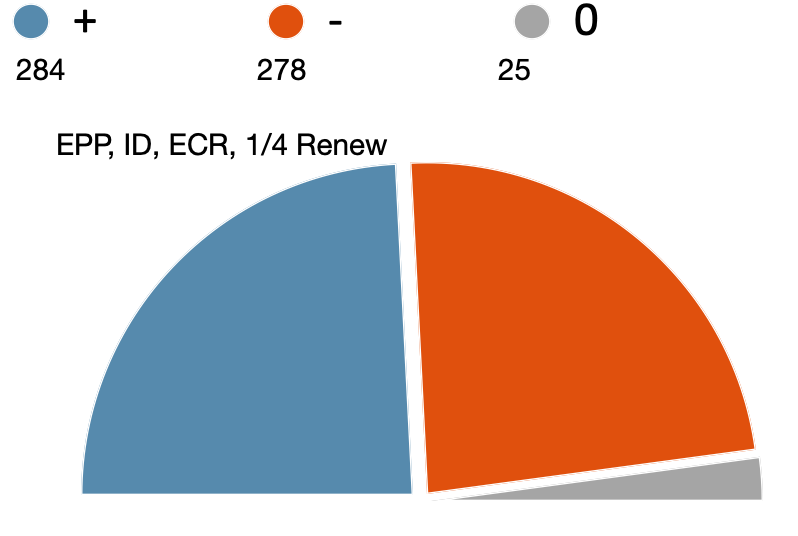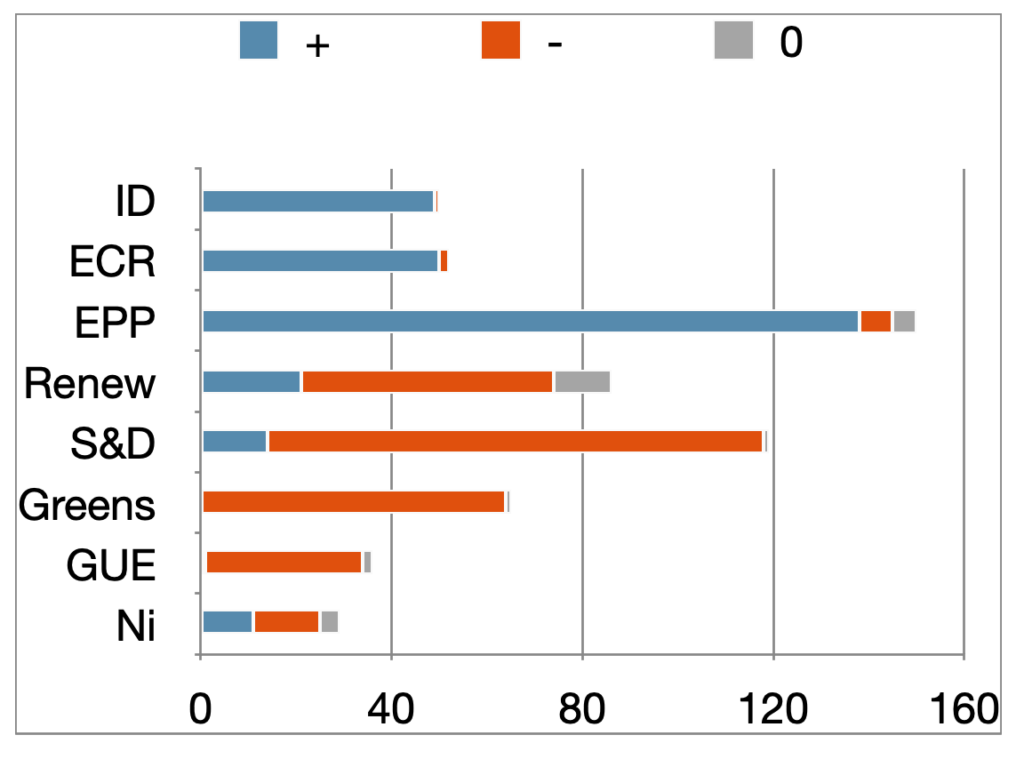Despite the Covid crises, the war developing in Ukraine and the fears of food shortages in Europe and neighbours’ countries, the Farm to Fork Strategy (F2F) is and remain a flag-ship project of the current European Commission in the context of the Green Deal.
If this political orientation was broadly welcomed and supported until recently, the concrete policy initiatives by the Commission as well as the global context generated debate on this strategy. While the environmental and climate challenge remains, the Farm to Fork is now confronted with an additional challenge: politics. The war in Ukraine has lit the doubts about the feasibility and consequences of the F2F, and fragmented the European Parliament which was until now the driving force on which the Commission was counting to go forward.
The scale of divisions creates uncertainty on the capacity to deliver consensus and a coherent policy path under the current conditions. As the assessment below shows from an initial broad consensus, we moved to a fragmented landscape, where votes are swinging in one direction or the other by only a few (see below).
It goes beyond any doubts the necessity of the transition, needed to assure long-term prosperity, as the International Panel on Climate Change reiterated in its last report. Nevertheless, it’s urgent to propose a policy pathway in a position to build a renewed consensus on a common project, providing guarantees on the feasibility and capacity to deliver of the Farm to Fork without undermining food security and viability of EU farms either in the short term or in a longer term.
This will be possible proposing credible, feasible, and inclusive policy paths. Enhanced sustainable agriculture and innovative agro-ecological principles, re-concealing both environmental and food challenges are showing that solutions exist and should be part of the discussion even more than in the past. Sustainability and food security should both be the lighthouses that guide this transition forward, as underlined already last year by Farm Europe during the Global Food Forum on “The Green Deal: How to make it a good deal?”.
If tangible and concrete solutions, that take environmental, societal, consumers’, and production needs into consideration exist, they require investment capacities. To help farmers grasp results quickly without undermining food security, the European Union will need to mobilise, not only new policy pathways but also financing capacities that go along. It’s now up to the Commission to build this new consensus and bring solutions forward, integrating them fully in the scope of the Farm to Fork as a coherent package.
The initial consensus
In May 2020, the European Commission proposed the Farm to Fork (F2F) Strategy, the agricultural branch of the more holistic Green Deal to make EU production, trade, and consumption more sustainable and resilient. The Strategy sets ambitious goals to be reached by 2030 and that involve mainly farmers as the principal actors of the sustainability transition in agriculture. Amongst the main targets foreseen by the strategy to be reached within 2030, there is:
- 50% cut in the use and risk of chemical pesticides and in the use of more hazardous pesticides,
- 20% at least reduced use of fertilizers,
- 50% cut of EU sales of antimicrobials for farmed animals and in aquaculture
- 25% at least of organically farmed area and a significant increase in organic aquaculture
Since its publication, stakeholders and academia from all over the EU mobilized to analyse and understand the feasibility of the Farm to Fork Strategy, while the co-legislators (Council of the EU and European Parliament) have been active in an open dialogue with the Commission to assure the overall sustainability of the strategy.
The European Parliament’s Committee on Agriculture (AGRI) and on Environment (ENVI) designated two rapporteurs, namely H. Dorfmann (EPP, IT) and A. Hazekamp (The Left, NL) to elaborate on the Parliament’s position on the Communication of the F2F. On October 19th of 2021 the Plenary of the house adopted its official position (vote: 452 in favour, 170 against, 76 abstentions), which supports the general ambitions of the strategy and asks for stronger measures to support the position of farmers in the supply chain. The EP -to certain extents- increased the ambitions of the original document an gave its green light to the initiatives including:
- An EU-wide nutritional label,
- A renewed ambition in reducing the consumption of meat and highly processed foods with high salt, sugar and fat levels,
- Set of binding reduction targets for pesticide use,
- Improvement of the pesticide approval process and better monitoring of their implementation
- Restore and enhance natural carbon sinks
- Reinforced animal welfare rules
- Support targets for organic agriculture
In this occasion, the majority was formed by the following political groups: GUE/NGL (which represented 5% of the voting majority), Greens (10%), Renew Europe (12%), EPP (15%), S&D (20%). ID and ECR voted strongly against (the two groups voted almost unanimously against the proposed legislation because they claimed not to respect the interest of farmers) cf Figure 1.
The Romanian delegation from the S&D voted against the communication; in the Renew Europe group, even if the majority of MEPs voted in favour of the resolution, a small group of 16 MEPs (mainly from Spain, Czech Republic, Germany) voted against. In the EPP, 36 votes – mainly coming from members with Austrian and Spanish nationalities- were expressed against the resolution.
Figure 1: Vote on the Farm to Fork by the Plenary of the European Parliament on October 19, 2021
The Farm to Fork in need for a new consensus
On March 24th, 2022, the European Parliament adopted a resolution on the “need for an urgent EU action plan to ensure food security inside and outside the EU”, as a response to the Russian invasion of Ukraine and the consequences of such events on the EU and global agricultural markets (notably, increase in the prices of fertilizers ad shortages of grains crops).
The resolution acknowledges the dependence of the EU from third countries imports of energy, primary goods, chemicals and chemical products, and stressing actions to reduce dependency. But beyond the short-term challenges, it also re-opened the political discussion on the long-term strategy for EU food systems, and on the Farm to Fork in particular.
The resolution calls for the EU to express all its agricultural production potential by allowing fallow lands to be used for growing crops (on Ecological Focus Areas, allowing the use of plant protection products and fertilizers, notably to foster the production of proteins), liberating CAP crises reserve funds, implementing the measures against market disturbance foreseen in the CMO regulation to support the most affected sectors, the revision of the National Strategic Plans to allow more flexibilities (notably in view to increase the acreage of lands under production), allow stronger state aid measures, to grant flexibilities regarding advance payments to producers. It also led the European Commission to a temporary ‘pause’ in the implementation of some sustainability ambitions outlined in the F2F, namely a temporary derogation from the nitrogen directive to allow an increased use of nitrogen form animal manure as an alternative fertilizer.
On this occasion, the majority that in October of the previous year supported the Farm to Fork strategy slimmed by a lot, in particular within the EPP group. Nevertheless, the overall direction of the F2F has been kept, with the amendments proposed by EPP member Dorfmann – that tried to suspend legislative actions related to (amendment 9) or revise (am. 8) some of the targets and timetable of the strategy – that were rejected by a very slim majority[1]composed by S&D, Renew, The Left, and the Greens.
In this occasion, we can see a net rift between the Progressives and the Christian Democrats since the former strongly voted for maintaining the F2F targets as set in the October’s vote, while the latter was almost unanimous to vote for a revision and, possibly, for their suspension.
Amendment 9 aimed at suspending legislative initiatives that would lead to a reduction of agricultural production. It was blocked by a majority of 50 composed also by 16 members of the EPP (in particular the Irish delegation) that decided to dissociate from the group’s direction by voting against the amendment.
Figure 2: vote on proposed amendment 8 – Communication on Food Security, 24/03/2022
On the contrary, the Parliament position on the need to do and take into account the results of a “comprehensive impact assessment of European food security and of the situation in neighbouring countries” has been reiterated with a favourable vote for amendment n.10, tabled by Dorfmann. In this case, here also with a narrow majority of 22 votes in the opposite direction.
It is also by a slim majority (6 votes strong) that the amendment (n.11, tabled by Dorfmann) calling on the impossibility to reduce by 10% production areas was adopted (Figure 3).
Figure 3: vote on the proposed amendment 11 – Communication on Food Security, 24/03/2022
Likewise, am. 12, concerning the possibility to use plant protection products and fertilizers on Ecological Focus Areas (always tabled by Dorfmann), passed by 8 votes. Whereas the modifications aimed at strengthening the principles and objectives of the Green Deal and to “fast-track” the work on the legislative framework within the F2F & Biodiversity strategies (am. 15 & 16 tabled by Hazekamp, the Left) were rejected by a comfortable majority (formed by EPP, S&D, Renew, ECR, ID).
This new political reality calls for a new political dynamic to deliver the Farm to Fork, which is too important to be a strategy played with a coin toss. Food systems require a bold and coherent policy framework which can only achieve via a broad political consensus shared politically within the European Parliament, but also among the actors of the agricultural sector which will ultimately be the one delivering it.
ANNEX – Position of the political Groups in the European Parliament on the Farm to Fork Strategy
European People Party
The centre-right Christian democrats in the EP have been supportive of the general framework that the Farm to Fork strategy intends to design. However, several improvements have been proposed and many concerns on its consequences have been underlined over the months. Their focus on sustainability also reflected their instances on the concerns on agricultural production and towards the interest of the producers, mainly carefully considering the consequences of the implementation of the strategy on EU agricultural outputs and on assuring a level of income to farmers that would not disincentive them from the implementation of ecological sustainability measures. “For the EPP Group, it is crucial that new rules for food production do not lead to less food being produced in Europe or being dependent on food imports from outside the EU”, is stated on the group’s website. The group advocates for a thorough and holistic impact assessment of the strategy, accusing the Commission (notably in the person of Vice-Executive President Timmermans) of explicitly avoiding the assessment knowing the negative outcomes for the sector (loss of incomes for producers) and for consumers (increased food costs): “we agree with the goals, but we need alternatives for how to reach these goals, for the best interests of consumers, farmers and the environment” said Christine Schneider (AT), shadow rapporteur on the file in the ENVI Committee. The EPP also criticises the possibility of importing deforestation because of the inducted reduction of the EU domestic production, and the consequent increase in imports from third countries where environmental standards are not as strict as the European ones: “if we replace European quality food with imported food, we will be shooting ourselves in the foot importing food from abroad means exporting our carbon footprint outside Europe”, Dorfmann said. The group also supports more investments in innovation & research, as well as the principle of subsidiarity, advocating for stronger inclusion of national and regional level for the decision-making and implementation of the policy.
The coordinator of the group within the Agri Committee, and rapporteur on the file H. Dorfmann (IT) defended these guidelines, stressing several times to effectively distribute the burden of the transition on every actor of the food value chain (to really include all the stakeholders from the farm to the fork), pointing out that the responsibility of implementing the strategy -and the possible negative consequences in economic terms- would be bear only -or mainly- by farmers.
After the recent events in Ukraine and their impacts on the EU food security, the EPP has been demanding to postpone some of the transition changes that the F2F strategy requires. M. Dorfmann, at the meeting of the ComAgri of March 17, 2022, asked the Commission to ‘put on hold’ some of the initiatives under the F2F, such as the revision of the pesticide directive and the nature restoration law that, according to the group, might undermine the EU food production. The EPP group also called for a European strategic food safety plan to address the disruption of the food value chain that the military actions in Ukraine will cause in the near future by a sector-by-sector approach. The group agreed on the proposal to use set aside areas to dedicate to protein crop growth, within their general call involving “sustainable intensification that would allow increased production output with fewer inputs” to, overall, reduce the dependency on third-countries imports.
Socialist & Democrats
The second largest political family in the EU Parliament has welcomed the Farm to Fork strategy since its publication, supporting the ecological transition that the strategy aims to deliver, as well as its targets: “the Farm to Fork strategy is possibly the last call we have to make the whole food production system in Europe healthier – with less pesticides, antibiotics, and fertilizers; more sustainable; protecting biodiversity; more just; with decent remuneration for our farmers and decent working conditions in the food chain; and last but not least up to our commitment to defend the environment and fight climate change”, it can be read in the group’s website. Nevertheless, many critics have been moved towards the F2F, notably on the feasibility of its implementation and on the actual impacts of the strategy. Many comments are shared with the Christian-Democrats in the EP, such as the fact that the Commission is refusing to publish a comprehensive impact assessment of all the policy initiatives included in the strategy, the concerns over food prices raise, the weakening of the position of farmers in the value chain, and the loss of influence in international trade dynamics. One aspect that clearly defines the position of the S&D group on the F2F from the other political families is their attention to the social aspect of the policy initiative, notably on making sure that workers’ rights and general wellbeing (working conditions and remuneration) is not compromised during the implementation of the strategy. As De Castro (IT), former coordinator of the group within the AGRI Committee, said, “the priorities of this strategy should be the respect of human rights and of workers, fair competition, and environmental protection”. They have been defending and promoting “social sustainability” together with the economic and environmental aspects. Moreover, a specific attention has been given to consumers’ interests in ensuring that transparent information is transmitted as well as fair prices. In fact, the group coordinator within the AGRI Committee, Aguilera (ES) “believe[s] first and foremost that food should remain affordable for everyone as well as sustainable and that greater emphasis is needed on education and information rather than imposing”.
The group also supports more investments in innovation & research.
The topic of nutritional information to consumers (via National Front-of-package labelling systems), that is foreseen within the strategy, has been addressed by many members of the group particularly active in this regard have been De Castro (IT), Aguilera (ES), Andrieu (FR), Tarabella (BE) who participated in events and elaborated their position in favour of a truly informative and unbiased label (notably by taking position against the much debated ‘NutriScore’*).
Borzan (HR), shadow rapporteur on the opinion in the ENVI committee stated that “our group supports a holistic approach to the necessary changes in the good production sector, at a pace that will leave no one behind. Our priority is that everyone profits from the reforms: consumers with healthy and quality food; farmers with fair remuneration and protection from unfair competition; the environment with less pressure from agriculture”.
*In opposition to this specific Front-of-Pack labelling tool are the members of the ID & ECR groups -notably Sardone (IT), Fiocchi (IT, Regimenti (IT)-.
After the recent events in Ukraine and their impacts on the EU food security, the S&D group has been demanding for the Commission to allow specific temporary deregulation for growing crops (notably, protein-rich plants) in fallow lands and in ecological focus areas by allowing the use of pesticides and fertilizers, so to enhance independence from imports of such goods. To move the agricultural crisis reserve foreseen by the CAP, as well as allowing for more flexible state aid rules and, eventually, to re-evaluate import quotas for crucial commodities (being cereals, soybean and fertilizers).
It considers this moment an opportunity to re-design the EU food system, “taking into account the lessons learned from the impact of the was in Ukraine” to assure a system that provides food security independently from imports. They call, therefore, for food security to be central in international policy decision-making, to address food waste & lost, and to tackle poverty while boosting social policies.
Renew Europe
Renew Europe, as the third-largest political group in the European Parliament, endorses the Farm to Fork strategy, and worked in order to “make sure that this transition towards more sustainable agriculture will be economically viable for all farmers in the EU and will create new economic opportunities in light of the need to take up of new practices and technologies”. The Renew Europe group set the environmental protection policies as one of the priorities in their position, alongside technological development and citizens empowerment, calling for increased transparency and making information more available. Through this strategy, the group says, agriculture can contribute positively to the circular economy, increase the competitiveness of the sector, and fight pollution and food waste alongside pesticide, fertilizers, and antibiotics reduction.
The support and inclusion of the farming community for the strategy’s objectives has been one of the group’s priorities as well, as Hlavacek (CZ) repeatedly stressed several times over the years in his interventions, along the fact to redistribute more equally the burden of the transition throughout the value chain actors.
Tolleret (FR), in several public interventions proposed investments in innovation and new technologies as the main tool to reach the sustainability objectives set in the strategy. According to her, however, “investments in research are lacking and digitalisation is still unthinkable in many rural areas”, “in the future, we should better recognise the efforts done by farmers and support them in order to safeguard the EU competitiveness making economic goals compatible with the environment and the food safety is essential if we want to keep providing high quality products to consumers”.
Christensen (DK), shadow rapporteur for the ENVI Committee stated that the F2F “forms the basis of future sustainable farming through the development of the circular economy not least through implementation of both existing and new green technology, which is going to play a significant role in the green transition”.
After the recent events in Ukraine and their impacts on the EU food security, the Renew Europe group has been demanding, as the other main groups in the EP, a turn in the EU food policy so to independently assure food security for the continent and for, at least, its neighbours countries, “to increase resilience into food supply chain, particularly at the level of access to inputs, and to address the weaknesses that an over-reliance on imports of energy, feed and fertilizers from a single or too few suppliers” lead to. All along, the group says, the objectives of the F2F and Green Deal should not be undermined. On the contrary, the action plan to ensure food security represents an opportunity for these policies “to accelerate the achievement of the objectives of the Green Deal, which will strengthen the robustness of EU food supply chains […] via the increased uptake of innovative tools, cultivation technologies and sustainable processes and practices”. In this context, the group argues, a comprehensive assessment of the impacts of all policies initiatives foreseen in the strategy is needed now more than ever. Call for stronger incentives at the level of production, allowing for temporary and short-term flexibilities with conditionalities and consider derogations, to allow for set-aside land to be cultivated, to use organic fertilizers, to enhance the use of bioenergy, address the problem of food waste at all stages of the chain.
The three main political groups in the European Parliament (EPP, S&D, Renew) all support the use of innovative technologies and increase financial support to Research and Innovation in the field as a tool to foster both agricultural production while respecting the goals of the Green Deal. In particular, the use and development of ‘New Genomic Techniques’ is fostered and considered a fundamental tool for the achievement of the F2F targets.
The Greens/EFA
The Greens welcomed and approved the Farm to Fork strategy communication as the tool to change the agricultural production system and the consumption patterns towards increased environmentally-friendly context. The group contributed also to increase the environmental sustainability standards of the strategy, notably as for organic agriculture targets and the reduction of synthetic pesticides. The Greens, in fact, argue that “although the lower use of synthetic use of pesticides and fertilizers does not lead to a drop in yields, and mechanical weeding requires additional labour, these higher costs are offset by higher prices on the organic markets”.
The group advocated for the reduction of pesticides and antibiotics as well as mandatory origin labelling of all food, mandatory front of pack nutrition labelling, mandatory due diligence throughout the supply chain and, very importantly for the political group, a binding link between the CAP strategic plans and the Green Deal. As the shadow rapporteur on the strategy in the Agri Committee, Metz (LU), said, “the Common Agricultural Policy is a missed opportunity for the EU to realize its Green Deal ambitions […]. If the CAP were fit for purpose, it could serve as a much-needed tool for the ambitious goals of the Farm to Fork Strategy. It is imperative that the strategy be firmly embedded in the CAP for the good of people and the planet”. The Greens, as stated, contributed to increase the bar as far as sustainability standards of the strategy are concerned. They call for an end to exports of pesticides that are banned in the EU, to stop importing products that are banned in the EU, to decrease the livestock density and, overall, to recognise the responsibility and contribution of traditional farming practices to climate change, strongly advocating for alternative solutions such as organic farming, agroecology, regenerative farming. Moreover, they made pressure to phase out cages on animal farming, harmonize front-of-pack nutritional labels as well as animal-welfare labels and on animal production methods.
Wiener (AU) made food waste reduction her main battle: “as long as we have no economic incentive to avoid food waste, this system will not change”, she said.
The group has always been supportive of the general ideas of the strategy, but often criticized the general approach of the Agri Committee or of the Parliament accusing the majority of representing the interests of industrial multinational groups and of boycotting the Green Deal with short-sighted solutions. All in all, the Green group advocates for a better quality agricultural production over the quantity, defending more eco-friendly methods of production that, they admit, bring yield reduction, but higher nutritional added value food.
After the recent events in Ukraine and their impacts on the EU food security, the Greens in the European Parliament have been strongly defending the targets and ambitions of the Green Deal and, notably the Farm to Fork and Biodiversity strategies, asking not to lower the bar and that, instead, the context favours their ambitions towards increased independence and more environmental sustainability. In particular they oppose the proposals to use pesticides in EFAs and that “no measures taken during the Ukrainian crisis should lead to an increase in the use of synthetic pesticides and fertilizers”. Moreover, they ask to “further strengthen the Farm to Fork Strategy target on fertilizer use reduction, and to support […] practices to make the soil more fertile”. The group calls, nevertheless, for the suspension of fiscal rules in member states and “maintain the general escae clause brought in for the Covid-19 pandemic”, a ban on speculative practices to avoid speculation and inflated food prices, to set up financial support for fragile households, to activate the agricultural crisis reserve, further support to farmers (with sustainability conditionality). Points out that action is needed to address food waste & loss. They frontally attack biofuels, claiming to ban it and to dedicate the land to growing crops for human & animal consumption, while calling for the setting of an ambitious EU protein plan. The group closes by asking not to “cynically use[…] the war as an opportunity to roll back to a dysfunctional and inherently unsustainable status quo that is clearly and scientifically proven to be unfit for purpose and not to sacrifice our medium-long term food security for short-term gains such as the feeding of livestock and biofuels fermenters”.
GUE/NGL – The Left
The political group of which one of the co-rapporteur belonged to welcomed the Strategy when it was published and it contributed to set the bar even higher as far as sustainability targets are concerned. The group stands for “fair, healthier, and environmentally-friendly food system[s]” and their modifications to the Commission’s strategy proposal all pointed in the direction of improving the environmental impact of agri-food systems, even if that would mean a detriment of the EU agri-food production and a rise in food prices. The topic of animal welfare (notably on the ban on cages for farmed animals) has been particularly of interest for the group as a whole, as it is for the rapporteur herself, the Dutch Hazekamp. Another feature that characterizes The Left’s position on this strategy is the strong advocacy efforts done in order to reduce meat consumption (also through weakening of support tools such as the promotion policy), to defend biodiversity, sparring animal suffering, to set binding pesticide reduction targets and to end the exports of pesticides prohibited in the EU, support for agroforestry and nature-based solutions, and, overall, a protein transition towards more plant-based diets. During the plenary session of the European Parliament, she said that “the food system has to undergo a transition because the way we are feeding ourselves today undermines our future”, advocating for less meat in our diets and more plant-based substitutes. The Left group opposes intensive meat production and large-scale monocultures.
After the recent events in Ukraine and their impacts on the EU food security, The Left group supported the call to strengthen EU food security, stressing that the right to food is a basic and fundamental human right, asking Member States to develop aid structures to assure food supply to everyone. However, it stresses that “the availability of food is generally not a major challenge in the EU, while issues such as food waste, overconsumption and obesity, as well as the environmental footprint of European households’ food consumption, are more significant challenges facing the EU food system today”. The group stresses in many ways that the priority remains the fight against climate change and loss of biodiversity and that, therefore, the Ukrainian conflict should not be used as an excuse to lower the bar and pause/suspend the objectives of the Green Deal & F2F, even temporarily. In fact, they are “deeply concerned about current discussions in the re-evaluation of some of the agricultural elements of the Green Deal”, asking to Commission to “fast-track its work on its proposal for a legislative framework for a sustainable food system”. They underline their vision for the EU agriculture: increase the share of organic land, animal welfare standards, agro-ecological practices, favor extensive and permanent grassland-based, silvopastoral, organic animal husbandry, use of agro-forestry practices, amongst others. The group strongly opposes the proposal to allow fallow land for production purposes and the use of EFA, as well as the support of industrial livestock (suggesting to use the land where crops that are directed to animal feed and biofuels to grow crops for human consumption needs). However, they lack concrete proposals on how to assure food security to the continent.
Identity & Democracy / European Conservationists and Reformist
The two right-wing groups in the European Parliament have held similar views on the topic of the Farm to Fork Strategy, as it was confirmed by the vote in the plenary session that saw the vast majority of the members of both groups voting against the document. In fact, groups’ representatives have been opposing this initiative because it is considered not to represent the farmer’s interests, and putting environmental priorities over the economic interests of farms is the wrong path for growth. The ECR group accuses the strategy of “lack[ing] the ambitions to provide farmers with solutions and a clear vision of the model of agriculture [that] Europe needs”. Both groups have put into question the sustainability and growth targets of the strategy, mentioning studies that show that economic gains will be reduced along with agricultural production and exports, putting European food security at risk.
On many occasions, they have called on the revision of the actions foreseen in the F2F, advocating for a ‘business as usual’ model of farming. Aguilar (ES), from the ECR said “the Commission and the Parliament cannot ignore the clamor of the European agricultural sector and its experts [who] are pointing more and more clearly towards a bleak outlook if there are no substantial changes in the strategy”. Mr. Tertsch (ES), from the same political group, supported the view saying that “there is a long way to find a balance between environmental concern and the economic reality of the countryside”. The groups also recalled on respecting the principle of subsidiarity, advocating for stronger inclusion of national and regional level for the decision-making and implementation of the policy.
After the recent events in Ukraine and their impacts on the EU food security, ID & ECR groups supported the call to strengthen EU food security & to revise the “environmental objectives outlined in EU policies in the light of their cumulative impact on EU food security and the sector’s economic stability”, renewing the invitation to carry out a comprehensive cumulative impact assessment of the Green Deal targets and to suspend all initiatives that negatively impact food production. The ECR group opposes the production of biofuels for the same reasons exposed by the Greens and The Left. Both groups call for exceptional support to farmers and to use the crisis reserve only as a last resort. They plead for allowances and derogation to express the production potential of the EU, i.e., to grow crops in set-aside land, EFAs and to suspend crop-rotation rules. Also, they ask to Commission to revise the assessment of National Strategic Plans so to allow for higher acreage and to “revaluate the common agricultural policy’s green architecture”. Because of that, the ID group explicitly asks for a postponement of the Farm to Fork strategy’s environmental targets.
[1] For amendment 8: 274 in favour, 289 against, 20 abstentions. EPP compacted in favour, for the exception of 7 members. S&D voted against with the exception of two Romanian members who voted in favour.
For amendment 9: 254 in favour, 306 against, 21 abstentions.
Roll Call votes: https://www.europarl.europa.eu/doceo/document/PV-9-2022-03-24-RCV_EN.pdf
O artigo foi publicado originalmente em Farm Europe.

